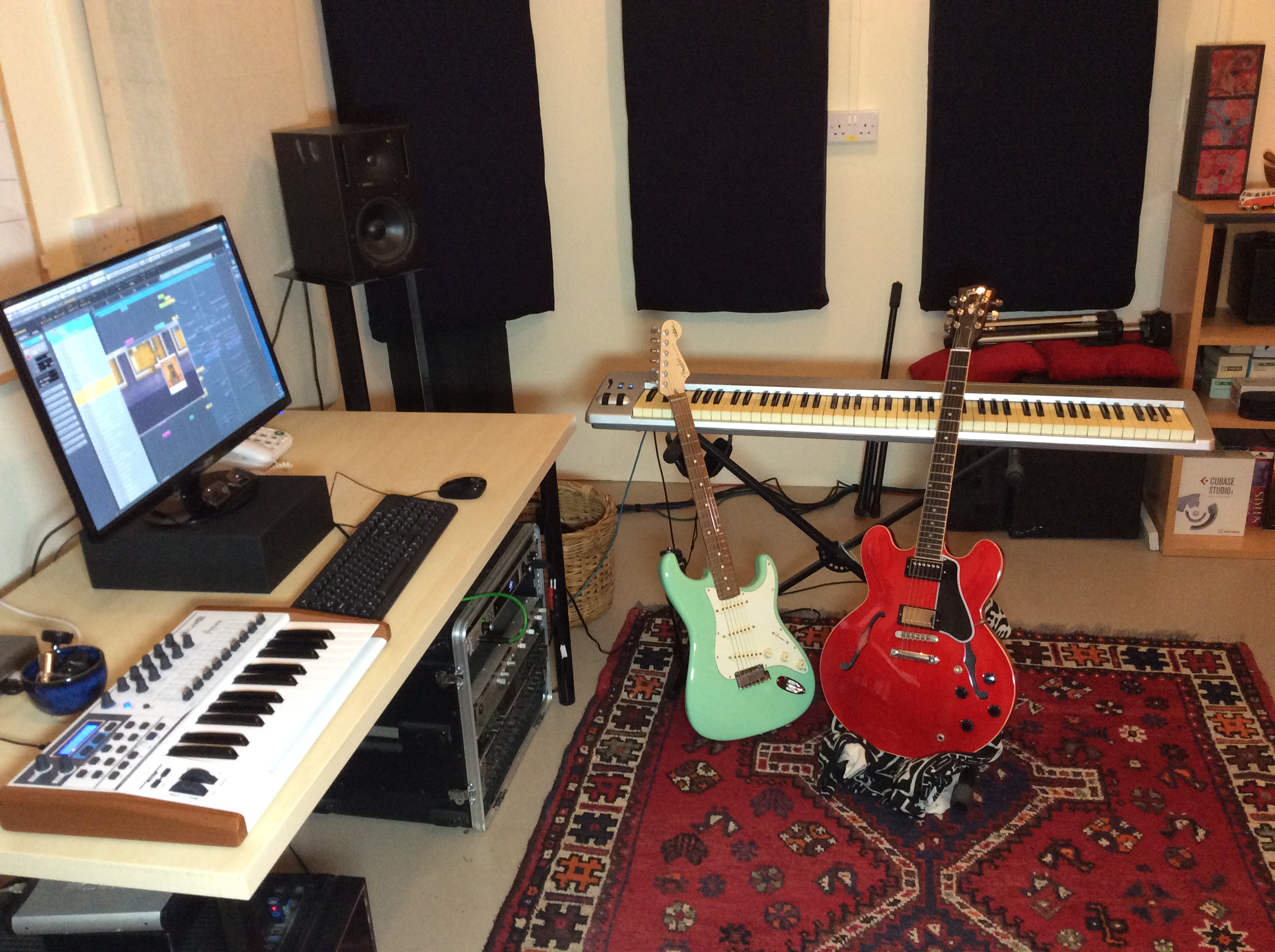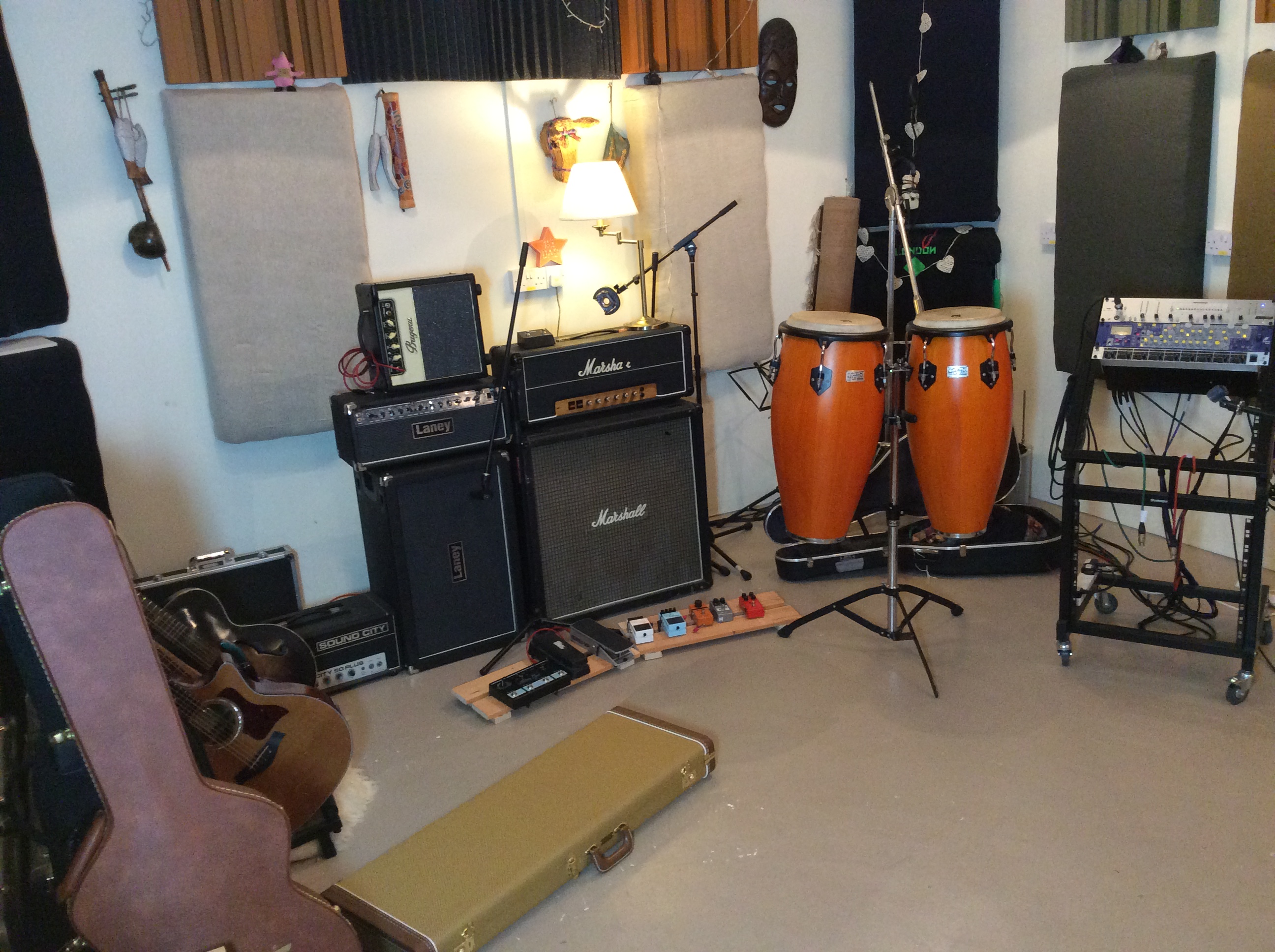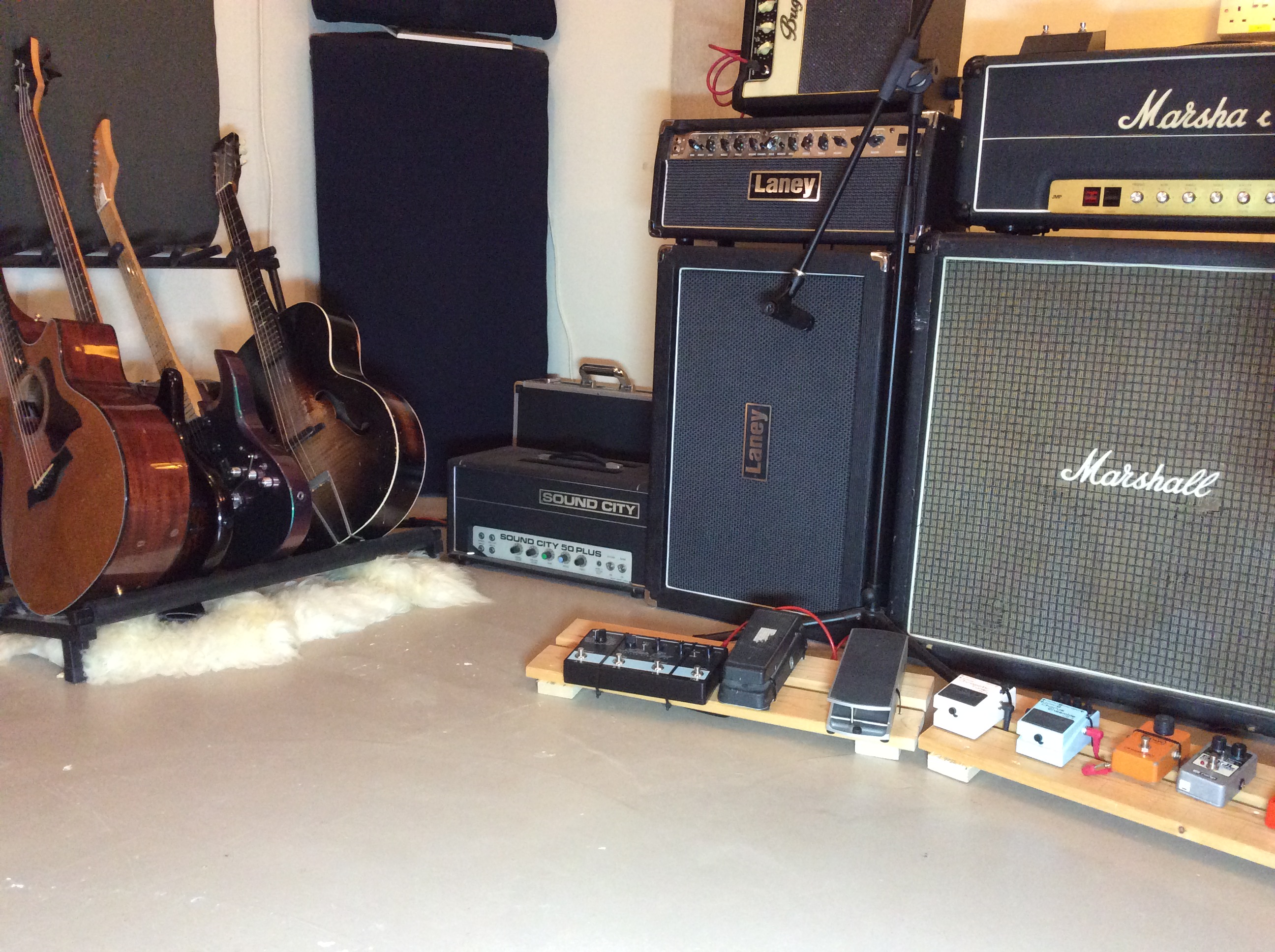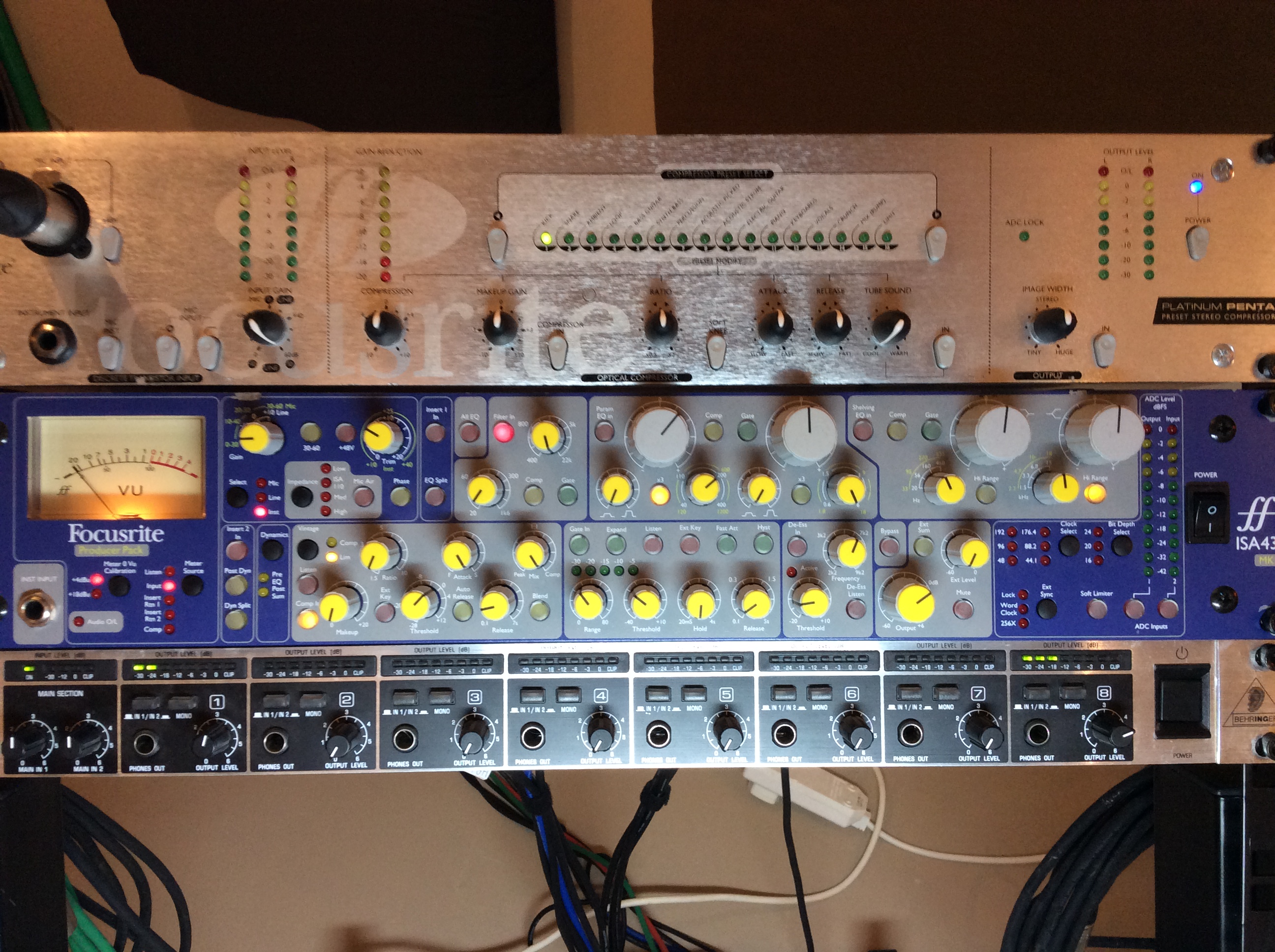
Each week on Show Us Your Rig, we feature PC gaming's best and brightest as they show us the systems they use to work and play.
It's been a little while since our last Show Us Your Rig, but we're coming back on a high note! We've featured Introversion Software before, back when Chris Delay showed us his custom built studio, but now that Prison Architect has officially launched, we're back with another member of the team. Alistair Lindsay is the Audio Architect on Prison Architect, and gave us a look at the musical paradise he works in. Guitars, keyboard, and more knobs and switches than I would know what to do with. Knobfeel, eat your heart out.
Lindsay was kind enough to show off his space and give some of the most detailed answers we've seen on the series yet.
What's in your PC?
It's custom built for creating audio by IntaAudio in the UK and is based around a quad i7. It's a few years old now and I've been waiting to finish work on Prison Architect so I can install my new PC. Due to all the other equipment and the number of DAW (digital audio workstation) software items and plug-ins that all have to play nicely with each other, swapping my machine over takes a day or two before I can be 100% happy the system is running as it should, and could certainly not be undertaken mid-project. I'm a freelancer, so waiting to be entirely project-free can take a while...
Anyway, I'm utterly salivating at the thought of using my new machine, which this time will be an Intel i7 Eight Core 5960X 3.0Ghz system with 64GB fast DDR4 quad channel, two 500GB SSDs, Dual DVI, running Windows 7 (very stable for my audio software), and will feature ultra quiet cooling to give me the completely silent running that I crave. Connected to this is a specialist UAD Apollo audio interface with high quality AD/DA converters in it and a bunch of its own dedicated processors that do further DSP tasks on the signals coming through the converters in real-time (zero-perceivable latency).
This set-up allows me to run in software multiple virtual recreations of various items of recording studio equipment. So that's why there isn't a huge mixing console in here and why there aren't racks and racks of special signal processors lining the walls any more either.

What's the most interesting/unique part of your setup?
Hard to pin down really. In one sense its probably the building itself. Being completely sound proof and windowless, when I step outside its like teleporting back from deep-space to planet earth, as one's nose, eyes, and ears are suddenly bombarded by the real world stimuli of the rural country setting in which my studio sits—a huge contrast to the silent and still atmosphere inside.
The exterior is built out of high density blocks 9 inches thick, then there's an inner wall which isn't allowed to touch the concrete floor and has to rest on special pads, and also hangs from special clips from the roof trusses above the ceiling rather than screwing directly into them. The ceiling board is 2 inches thick and has 20" of sound insulation sitting on top of it. The building is air-tight. Why go to all this trouble? Well, complete silence means I can record very very quiet sounds in here and make them sound like they are really loud if I want to. It means I can record sound FX sources or musical instruments at any time of the day or night and never have to worry about a passing car, singing bird life, or startled pheasant ruining an otherwise perfect performance. Laboratory conditions. It also means I can turn my Marshall stack up to eleven, although my ears almost bled when I turned it up to just past 3, and I don't want to go deaf so......
Keep up to date with the most important stories and the best deals, as picked by the PC Gamer team.

What's always within arm's reach on your desk?
My guitars which I use a LOT in my work, and the various bits of kit, new and vintage, that interact with them, to make any of the textures and sounds I end up creating for the music I make in here. I also have clever software that converts guitar playing into MIDI data in real-time if I want, allowing me to control anything from a digitally modeled kazoo to a whole orchestra from any of my guitars. I do play the piano keyboard too, but using the guitars instead creates an entirely different feel because the way you phrase or build chords or melody on a guitar is totally different to how its done on a piano keyboard. I feel this is important because there are so many great game composers out there already who use the piano keyboard as their interface with their computer, and I guess I want to sound and think differently to those guys rather than just compete directly with them. Same ends (creating music) but just using different dialects I guess.
I also do a heck of a lot of sound FX creation work too, so I think my 'sound designer head' would want to butt in and say that the collection of microphones I keep are also a vital part of my set up, and also my portable field-recorder. Zoom in on one of the builders in Prison Architect and you'll occasionally hear them whistling while they work. That's me whistling while I walked across the fields round here one afternoon!

What are you playing right now?
I've been so busy with work all year that time to play games seems to have migrated for the duration, and I am looking forward to getting back to some serious chill out time when I can get my hands on a mouse or controller for non-work purposes! Luckily the games I have been working on are really cool to play for fun anyway (perk of the job, right?) so the short answer to your question would be Prison Architect and RimWorld a heck of a lot, closely followed by Lumino City, Full Mojo Rampage, and Staxel. I wish I could get my hands on Battlefield 1942 again- the way you could jump out of one plane and parachute into another in mid air was sheer quality- I love surreal humour in games wether its deliberate or not!
What's your favorite game and why?
The one that really sparked it all off for me was Half Life. I had just got my first job in the games industry at Rare Ltd and Half Life had not long been released. The sense of being within a story that was unfolding around me was so immersive, and way that the sound design, use of music, and art style carried that atmosphere along was brilliantly done for its day. I never really got into the sequels as much as that first one.
I have a lot of love for 8-bit games from my childhood too by the way, especially Jeff Minter's games—I think their sense of surreal humour and psychadelic sound fx must have affected my young mind!


